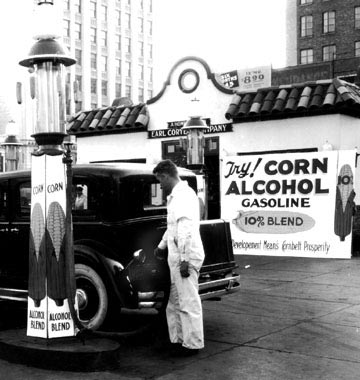Economist: Ethanol Driving-Up the Price of Food
We've been reporting on the insanity of growing crops to feed SUVs since the ethanol industry first appeared on the media radar. Aside from the fact that developing nations are cutting down rain forests to plant crops to provide fuel for western nations obsessed with global warming, there's GM Car Czar Maximum Bob's whole "taco riot" conundrum. Why use food crops for fuel when people need food more than fuel? The Economist analyzes the issue in their usual dry, authoritative manner, and it's scary stuff. "The demands of America's ethanol programme alone account for over half the world's unmet need for cereals. Without that programme, food prices would not be rising anything like as quickly as they have been. According to the World Bank, the grain needed to fill up an SUV would feed a person for a year… According to IFPRI [International Food Policy Research Institute], the expansion of ethanol and other biofuels could reduce calorie intake by another 4-8% in Africa and 2-5% in Asia by 2020. For some countries, such as Afghanistan and Nigeria, which are only just above subsistence levels, such a fall in living standards could be catastrophic." It's time for the fruited plain to stop. [Thanks to starlightmica for the link.]
More by Robert Farago


































Comments
Join the conversation
No matter how you look at it, FOOD->FUEL is a dumb proposal, and only supported by those who stand to benefit from it. A much simpler solution would be WASTE->FUEL. Get rid of a few environmental head-aches and make renewable fuel without affecting the price of food. Unfortunately, the WASTE lobby is not very strong in Washington, DC.
Cavendal -- I absolutely agree that the subsidies are bad and if I were Boss I'd eliminate them. It is still a free market though (which means multiple producers competing for business, multiple consumers competing for products, and prices that move with supply and demand) -- it is not correct to respond to all government interference by saying that makes it not free market. It is -- it's just an inefficient and somewhat distorted free market. Engineer -- well take your pick. Are US crops harmfully cheap because of subsidies, or harmfully expensive because of ethanol? Or did you intend satire of how anti-Americans think? I'll help you. US farm subsidies do not steal domestic markets from 3rd world farmers. They only steal the *US* market from them (same with Europe). Their local farmers are put out of business when their own governments CAP the local prices of food. They engage in just the opposite kind of government interference that we do -- instead of helping farmers at the expense of consumers, they help consumers at the expense of farmers (until they cannot import food for some reason, at which time consumers starve). One advantage to Ethanol raising food prices is that it does in fact give farmers in the developing world a chance to make money, if their own governments do not manage to kill the opportunity.
It seems to me rising food prices are an opportunity for the rural poor of the world, not a threat. That's a big reason why it's so popular in rural states of the USA. I think over time farmers will manage to produce food AND fuel, especially if we switch to smarter biofuel, that uses a lot less land and resources than are needed for corn.